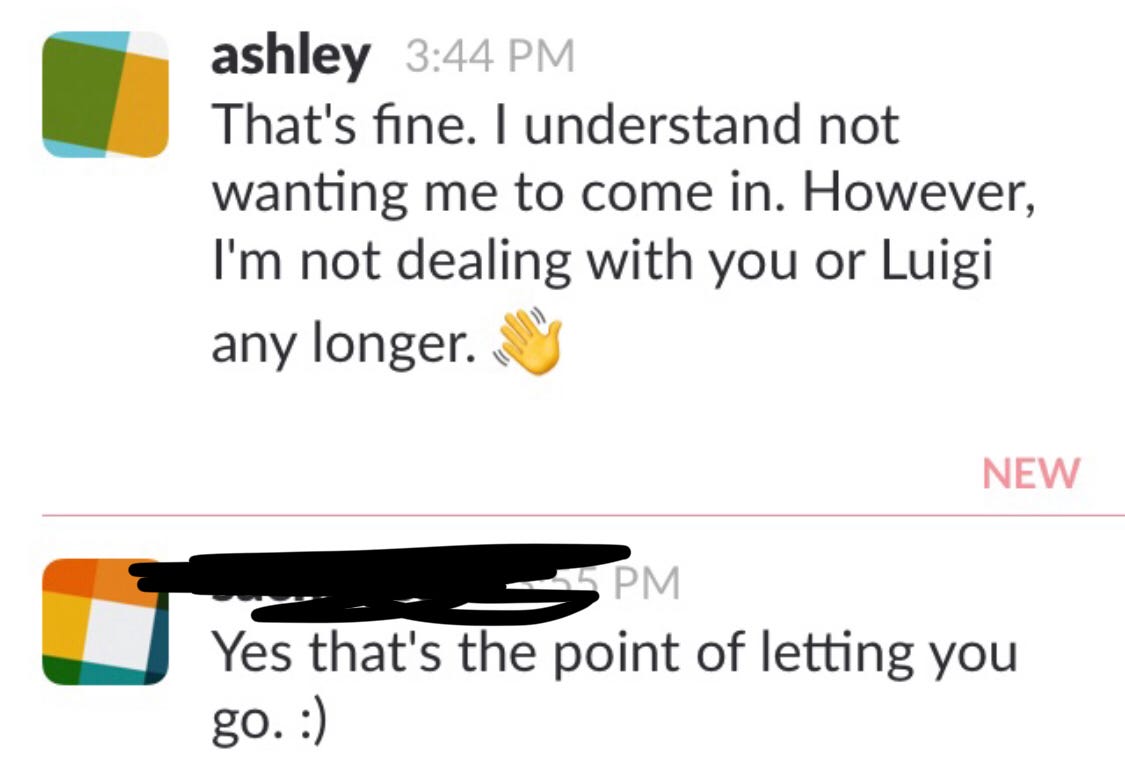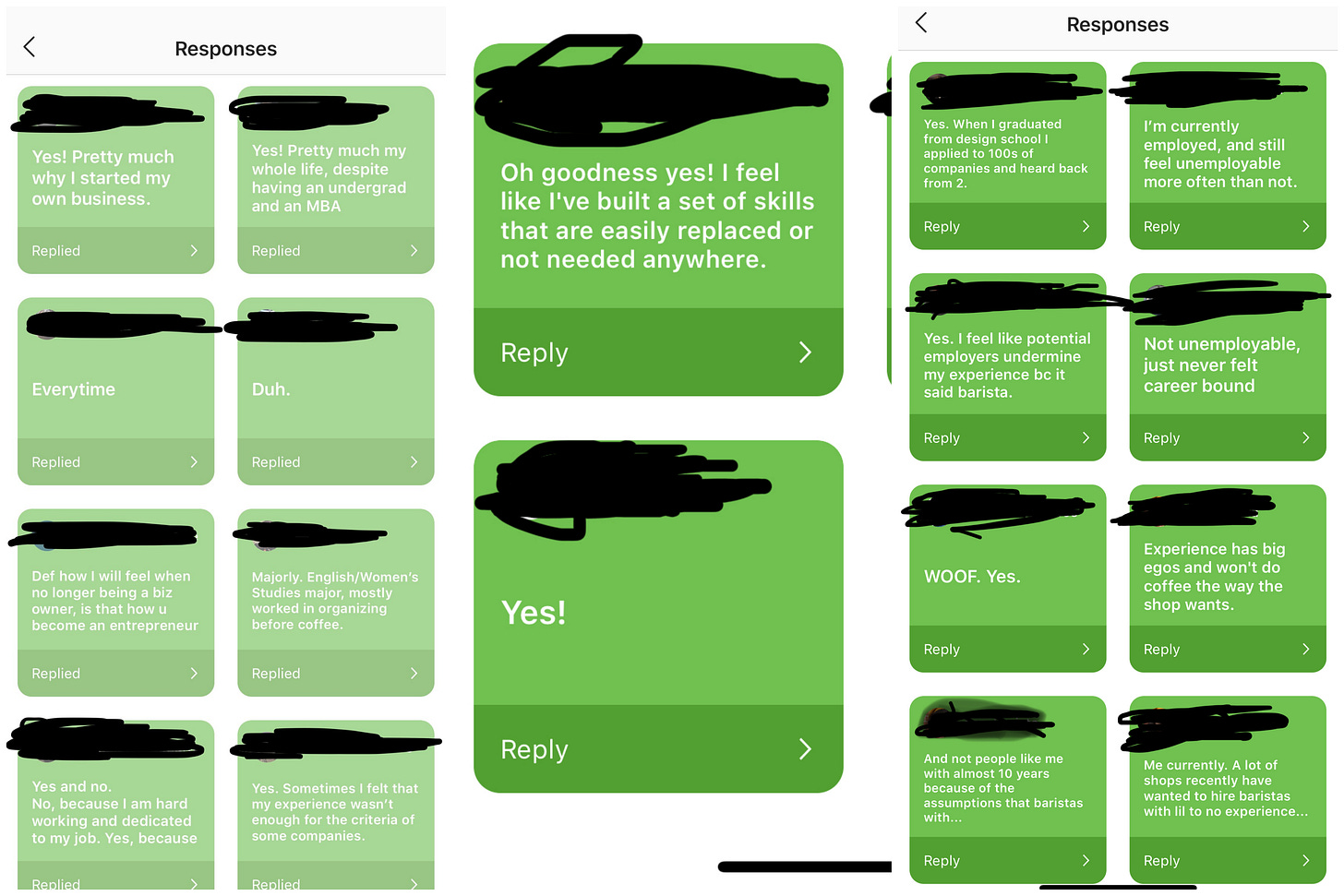If you’re not signed up for this newsletter, then welcome! I’m glad you found your way here! But like sign up, will ya? There’s a cute little button for you to do so.
And if you like this writing, consider donating to my Patreon. Any size pledge helps!

The advice that changed me—after it offended me.
I remember having a conversation with a friend of mine about our careers. I was frustrated with my job while he was thriving. Usually, our conversations revolved around bitching about our jobs, or how we’re not paid enough, or feeling like we continue to be stuck in the same shitty jobs we’re always in. But now, he was consulting for a major coffee company, and I was still treading through horrible job after horrible job.
I asked him if he thought I’d be miserable in every job I took.
He said, “Yeah, probably.”
That was not the response I expected.
He then clarified: “You might be unemployable.”
I wasn’t sure what to say to that. He could tell, so he continued: “No, being unemployable is a good thing! I realized I’m unemployable, and now I’m happier than I’ve ever been.”
That moment happened three years ago. Since then, I’ve come back to the idea of being unemployable a lot, especially as I’ve cycled through jobs and wondered, Am I the problem here?
My friend and I met while I was working a job that was particularly tense. My boss was an older man in his 40s. I was in my mid-twenties, and he told me one day that I was bad at my job. This was weeks after ignoring me at work and dismissing my texts. At one point he called me crazy for texting him a question about work.
I asked him to point to what I had done wrong. He said this had nothing to do with my job performance, but rather everything to do with who I was as a person. He told me I was selfish and disingenuous. I again asked how this affected my job performance. He pressured me to quit, I told him he could fire me if he liked.
I ended up quitting. I wasn’t that bold.
What interested me about this moment is that it felt strangely familiar. I felt like I had fallen into this pattern: a job sounds amazing, it goes well for a few weeks, then the red flags start going up. These red flags at first seem like oversights or mistakes, casual enough that you might even point them out in passing to your boss. Hey, did you notice we hired three men in a row? you might say to your boss who touts hiring a diverse employee pool. The comment is almost told in jest, a glimmer of the trust you have for your employer.
That’s when everything starts to change. You’ve raised your voice, and now there’s a target on your back.
As my friend defined, being unemployable doesn’t mean you’re bad at your job—often, it means the exact opposite.
No matter what job I took, things were never as they seemed. Nothing at work has ever aligned with the picture painted in an interview or job posting. After a honeymoon period, I’d begin noticing the cracks in the business. A misogynistic colleague that has never been reprimanded by management. A boss too preoccupied with small managerial tasks that they continuously push back check-ins that can result in wage increases.
Side note—if your employer promises you a wage increase after a certain period, like six months from employment, put it in your calendar RIGHT NOW. Your wages are too important for anyone to push back a meeting or continuously reschedule a check-in.
No employer is perfect. I’m certainly not either. Work conflicts are bound to occur, but they become a problem when there’s no room for feedback or creative discourse. That casual comment that turns into actual concern continues to be brushed off, simply written off as “the way we do things here” or avoided altogether.
My critical eye wasn’t always met with ire. Like me, you’ve probably had a discussion with a boss where you suggest some small improvement. Let’s say it’s moving something around to make things more efficient. Or you notice a discrepancy that costs the business money, and your insight is wildly prized. But that changes quickly.
A critical eye is soon met with resentment and anger. The suggestions that were at first met with excitement would later be met with dread and annoyance. And eventually, I’d get bitter and angry, and leave (or get fired on Slack, see below photo).

The flavor of being unemployable is different for everybody. For me, it’s being too critical. For others, it can be holding an employer accountable (didn’t you promise me a raise after six months when was hired? or why are there only white dudes working here?) or asking for things that are perfectly reasonable: can we sit down for my six-month performance review or could we publish the schedule a few weeks in advance instead of the day before?)
But those all come back to one thing—the things that you are good at and the things that are valuable to you are not always valuable to your employer. In fact, they’re often feared.
Most people don’t see their role as employers as being the leader of their staff. Likewise, they don’t see the role of their staff as helping to push their business and make it better. Instead, most employers see employees as just that—their employees. They post a job, a person fills it, and that’s that. Any questioning of that power is seen as annoying at best and cause for firing at worst.
And for many, that’s enough. Their boss is their boss and what they say goes. But for some, I imagine that’s not good enough. Shitty job situations don’t have to be tolerated, especially when another answer is so clear. But for so long, we’ve been taught that we’re the problem, and employers—those with the actual power to change something—are taught that they’re always in the right.
I imagine that there are a number of people reading this who have been told, over and over, that they’re the problem. That their requests are unreasonable. That they’re rocking the boat just to cause trouble. That they’re not the “right fit” for a business. That their skills aren’t right for a position. And I imagine a number of folks have internalized this. After hearing messages like this, you’re conditioned to think that you are the problem.

A selection of responses to my inquiry about feeling unemployable
Realizing I’m unemployable helped me get in tune with my needs at work. For years I felt inadequate or like I was complaining too much. But now, I feel assuredly confident in my abilities and know that my employers should see that as well.
I wanted this to be the first piece I wrote because I feel like there’s a number of you who feel like me. Being told by an employer that you’re causing a stir or that you’re too critical is demoralizing, and I’m here to tell you that you’re an asset.
Hold up! You made it to the bottom of this article! Thank you so much for reading! If you could do any or all of the following things, that’d be incredibly helpful!
Click the ‘heart’ at the bottom to say you liked it!
Consider checking out my Patreon!
Share this post with a friend, on your social media, anywhere! Here’s a button for you to do so!



